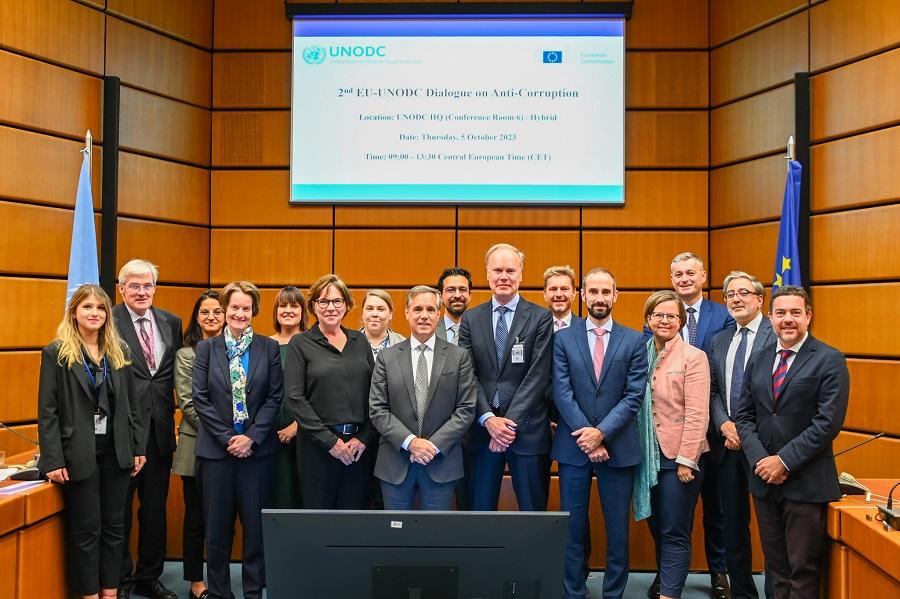
Vienna, 5 October 2023: The European Union (EU) and the United Nations Office on Drugs and Crime (UNODC) renewed their commitment to foster collaboration and align actions to tackle corruption together by holding the second dedicated EU-UNODC Anti-Corruption Dialogue in Vienna.
As a follow-up to the first EU-UNODC Anti-Corruption Dialogue held in Brussels in 2022, the meeting presented an opportunity to update on respective developments since last year, share progress on individual initiatives and identify new avenues for cooperation and synergy.
“It’s important to build on the first EU-UNODC Anti-Corruption Dialogue, continue to align our efforts in tackling corruption and cooperate more strategically on shared priorities”, stated John Brandolino, UNODC Director for Treaty Affairs. “Since the first dialogue, we have increased our engagement, for example on tackling corruption in sport, youth and education, and we are thankful for a long-standing partnership with the EU and support of UNODC on a number of priorities.”
“This is a pivotal moment in the fight to corruption by the European Union. We have just established the EU network against corruption, which will start working on corruption risk-mapping, as to inform the future EU anticorruption strategy. The negotiations for the adoption of the Directive to combat corruption continue, with the goal to keep the ambitious at the highest level” said Director Nielsen, from the DG HOME of the EU Commission “In these actions, we are fortunate to collaborate with the UNODC, as a strategic partner, also collecting specific data in order to support evidence-based policies”.
Corruption as a key obstacle to the rule of law, democracies, economies, and sustainable development
Corruption is highly damaging to society, democracies, economies, and individuals. It undermines the institutions on which we depend, diluting their credibility as well as their ability to deliver policies and quality public services. Corruption is an impediment to sustainable economic growth, diverting resources from productive outcomes, undermining the efficiency of public spending, and deepening social inequalities.
To further advance these actions, the dialogue touched upon thematic areas of mutual interest like the intersection of corruption and gender, empowering youth through fostering a culture of non-tolerance towards corruption, institutional accountability and linkages between corruption and organised crimes.
The meeting provided an opportunity to discuss joint actions against corruption. The newly established EU Network Against Corruption was presented, which aims to provide new impetus to corruption prevention efforts across the EU and develop best practices and practical guidance in various areas of common interest. The EU network can also contribute to the European Commission’s anti-corruption work, including through the mapping of high-risk areas for corruption - a concrete deliverable for 2024. Through the Network, UNODC and other members will collaborate in the mapping areas of high-risk of corruption in the EU, share knowledge and best practices, which will also be used for the development of the first EU strategy against corruption.
In addition to some EU Member States, in 2023 the European Public Prosecutors Office (EPPO) has joined the Global Operational Network of Anti-Corruption Law Enforcement Authorities (GlobE Network) to exchange information and good practices in combating cross-border corruption offences.
During the meeting, the EU reiterated its commitment to the ongoing review of the implementation of the UN Convention against Corruption, which remains an important deliverable as noted in a communication on the fight against corruption, as well as on the debate that will bring to the future implementation review mechanism.
Anti-corruption responses in crisis and fragile contexts
Participants also discussed the intersection between corruption, security and fragility. Operations linked to peace and stability may be characterized by high levels of corruption, which can both cause and prolong conflicts. Corruption undermines the rule of law and efforts to ensure both State effectiveness (the ability to govern) and State legitimacy (the recognition of the right to govern). Curbing corruption is therefore vital in post-conflict environments in order to re-establish the rule of the law and restore trust in public institutions.
Way forward
The dialogue resulted in a number of concrete action points to enhance cooperation and achieve shared success.
Single actions were proposed in boosting multilateralism, like the collaboration in the recently established EU Network against Corruption – which UNODC is part of – in order to strengthen the multilevel collaboration amongst organisations and develop the next generation of review mechanisms. The importance of effective programmatic anti-corruption cooperation at the regional and country level was emphasised with a view to building stronger synergies. The participants shared a mutual interest to this goal, consistent with UNODC’s recent efforts of increasing the field presence and the provision of technical assistance through the establishment of Anti-Corruption Regional Hubs and the expanded cooperation with regional organizations.
The participants also spotlighted the upcoming tenth session of the Conference of the States Parties to the UN Convention against Corruption as a unique opportunity to promote the importance of coordinated efforts and harness the collective power of our important work together as a global community united against corruption.
As we celebrate the 20th anniversary of the UN Convention against Corruption on 31 October 2023, it is not only important to reflect on its achievements to date, but also to realize its vision of uniting the world against corruption and building strong partnerships and international cooperation to achieve its goals.
Details
- Publication date
- 6 October 2023
- Author
- Directorate-General for Migration and Home Affairs
